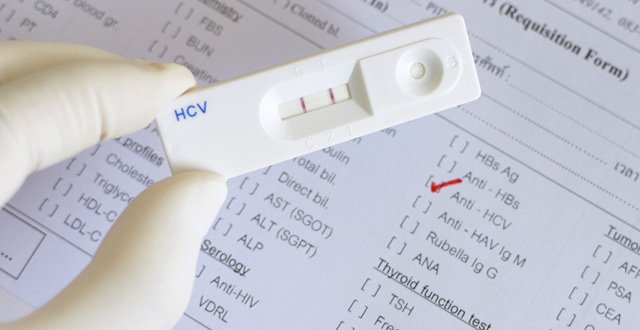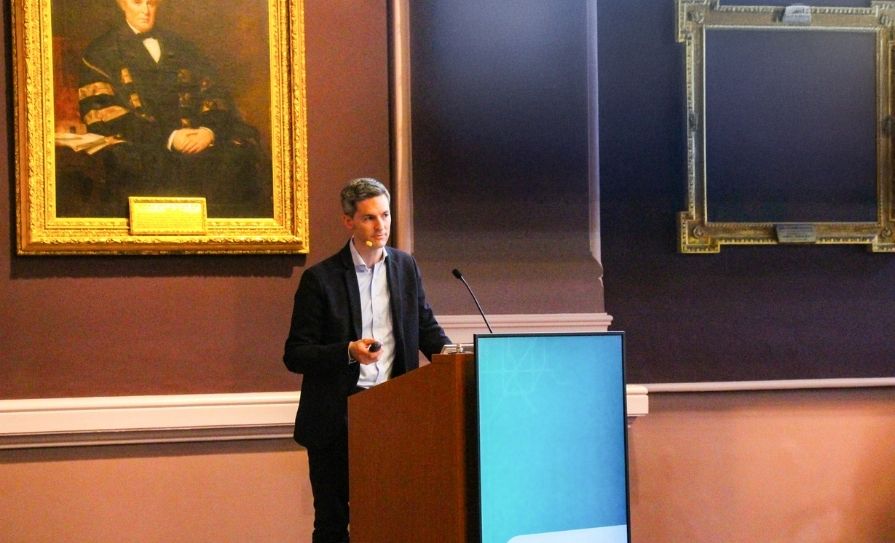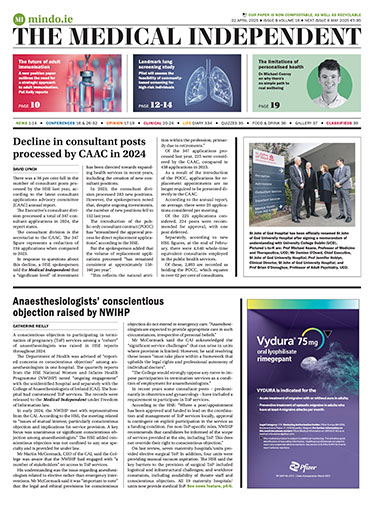Patrick Gallagher was “in a tough place this time last year” before direct-acting antivirals (DAAs) “revolutionised” his life, curing him of hepatitis C.
A former injecting drug user who now works in education, Mr Gallagher contracted hepatitis C in the 1990s. He was advised it would kill him, but not for about 30 years; he was told “not to worry about it”.
“And if you’re a drug user, 30 years is a very long time away — half-four is a long time away,” he said.
But the effects of the virus began to take hold at a time of great hope in his life.
Mr Gallagher told attendees at a seminar in Dublin, hosted by the Hepatitis C Partnership in late 2017: “I was sober finally, I was back working, things were starting to look good but I could barely get out of bed… I was exhausted, I felt sick all the time, I constantly got secondary infection, I always had some sort of flu or other thing going on. My skin was in terrible condition, I could gain no weight.
“But something simple happened — they gave me this medication and I got well… My life hasn’t changed just a little bit; it has actually been revolutionised. I get out of bed and I feel okay, I am not tired. I got up for work at seven o’clock yesterday morning and I got home at half seven last night, I had dinner and sat down to watch the telly and felt good. That to me is priceless. I didn’t imagine that life could be like that. Before that, by three o’clock in the day I was done.”
Scans showed he had progressed to moderate liver disease, “and if that is moderate, I wouldn’t like to see it severe”.
Mr Gallagher expressed gratitude to Dr Jack Lambert, Consultant in Infectious Diseases at the Mater Hospital, Dublin, who also spoke at the seminar, and to hepatitis C and addiction support service Community Response.
<h3 class=”subheadMIstyles”>Community services</h3>
Since 2015, DAAs have been accorded an annual budget of €30 million under the HSE National Hepatitis C Treatment Programme (NHCTP). But clinicians and community stakeholders are fervently calling for better-resourced outreach and support, as well as testing and care in community settings. They strongly believe there are significant numbers of unidentified progressive cases among the populations primarily affected by hepatitis C, ie, former and current injecting drug-users, which are hard-to-reach groups.
According to Mr Gallagher, outreach is required for people who have recovered from addiction and who may fear being tested for hepatitis C, and for people mired in addiction and its associated chaos.
“Community Response run groups where people who have been through the treatment talk to people who are on it, help them to get through it, and that is not just important; that is vital,” he said.
He added: “There is no reason why you shouldn’t help people who are still in addiction and get them over hepatitis C, because then you’ll have less people in addiction who end up contracting hepatitis C.”
Opening the seminar, Ms Nicola Perry of Community Response said the HSE’s NHCTP “should not just be about paying for drug treatments”. She also called for more care to be shifted from hospital to community settings.
Dr Lambert questioned why all of the annual €30 million funding was designated for DAAs, rather than utilising some monies for community testing initiatives and other critical measures.
There are an estimated 30,000 people with hepatitis C in Ireland, mostly people who inject drugs, he noted. Approximately 2,000 have been treated under the HSE programme, while there are around 1,000 people on hospital registers who have not been treated. He said this left 27,000 people out in the community requiring treatment, and in the meantime, around 2,000 new infections were notified from 2014 to 2016.
While it is “great” to have monies for DAAs and to have signed-up to a pledge for viral elimination by 2030, “we have got to do a lot more than we are doing”.
Dr Lambert, who is a principal investigator of the EU-funded HepCare Europe programme, which involves development of community testing and treatment and peer support programmes, said efforts in the community in Ireland had been largely driven by volunteerism and “begging money” attained from the pharmaceutical industry.
There are a high number of patients not turning up at hospitals following referrals for hepatitis C treatment, he warned.
He estimated that about 2,500 people with critical or significant liver cirrhosis are not accessing care at hospitals. Dr Lambert maintained that all relevant settings must be utilised for testing and treatment which, aside from drug treatment centres, include homeless services, prisons and GP methadone-prescribing practices.
He also criticised the HSE for its delay in commencing community-based treatment pilots, which belatedly began in mid-2017 on a very small scale.
Dr Lambert called for the urgent convening of a forum to support the NHCTP in seeking implementation resources. He urged much greater collaboration between the programme, clinicians and all stakeholders.
<h3 class=”subheadMIstyles”>Priorities</h3>
Speaking prior to Dr Lambert, Ms Michelle Tait, Programme Manager of the NHCTP, said the programme was established in 2015 with the aim of making hepatitis C a rare disease. She conceded that “we have a huge journey to go through to get to that”.
“We are working towards the extension of treatment to as many patients as we can all the time, and extending the way in which treatment is delivered, extending the places in which patients will be able to access treatment into the future, and developing the models of care we need to have in place to support that,” she said.
Most recently, treatment was extended to a number of paediatric patients for the first time, she outlined.
“Overall, the SVR rates among patients since 2015 is greater than 90 per cent but in actual fact, since 2016, the SVR rates are somewhere in between 95-to-100 per cent,” she commented.
Current priorities for the NHCTP include developing shared models of care and devising strategies to continually identify patients and linking them into care.
Community-based pilots in the addiction services “commenced a little later than we envisaged”, as there were “a lot of governance considerations” and logistical issues that had to be accounted for, she said.
“We are evaluating what is happening with those pilots at the moment and granted, the number of patients who have gone through has been low in comparison to what we would have envisaged; however, I am expecting that the numbers of patients going through those sites is going to increase substantially now over the coming weeks and months.
“Phase 2 of our programme is really to develop more of these pilot programmes within the drug treatment centres. I suppose we are looking within that at how innovative we can be, so rather than have the patient coming to a centre that is also a dispensing site, perhaps we need to give consideration to some other settings where that happens… We are hoping then [in 2018] to look at piloting a drug treatment programme within the prison setting as well, and we have had some discussions with colleagues about that… ”
Ultimately, the NHCTP also sees the dispensing of hepatitis C drugs in the community as something to aspire to.
“I would really like to think that we can mainstream our hep C treatment programme as much as possible in the coming years.”
<h3 class=”subheadMIstyles”>Investment</h3>
On challenges for the programme, Ms Tait said “investment in the treatment programme to date has been for drugs, so that is a day-to-day struggle that we have in the treatment programme, in that the budget that we have is assigned to the drugs only. We are working hard to get a better understanding of the requirement of everything to be invested in and not just the drugs, and it has been a significant investment of €30 million to date, but we would agree with everybody today that investment in some of the other areas around resourcing the really important supports that need to be in place to support the treatment programme is essential, as well as investing in finding the patients, screening… ”
Responding to comments at the seminar that Ireland was paying over and above other countries for DAAs, Ms Tait said, “we possibly are”. She said treatment had extended to more patients “by some of the work we have done with suppliers, but the costs are still significant”.
She said 13 patients are receiving treatment or have completed treatment in the community setting and there are plans to “grow that into the hundreds” this year.
“Even from my point of view, bringing the expensive hep C drugs out of the hospital setting was quite a convincing argument I had to put forward in the HSE to allow us to do that, which is why the evidence we are getting back from the current pilot sites will really help us to make that argument stronger as we keep going in that direction.”
She concurred with other stakeholders on the importance of resourcing the hepatitis C screening guidelines.
The aspiration is also to bring together different strands of work, including implementation of the screening guidelines and the national strategy, under the umbrella of a national hepatitis C programme in the HSE.
“I think we will get there with that,” she added.
Earlier at the seminar, Mr Charles Gore, President of the World Hepatitis Alliance and CEO of the Hepatitis C Trust, UK, drew attention to a 2016 finding from the Polaris Observatory, reporting on hepatitis C virus elimination targets, which showed Ireland as “not on track” to achieve viral elimination by 2030.
The seminar was also addressed by Minister of State for Health Promotion and Drugs Strategy Catherine Byrne.













Leave a Reply
You must be logged in to post a comment.